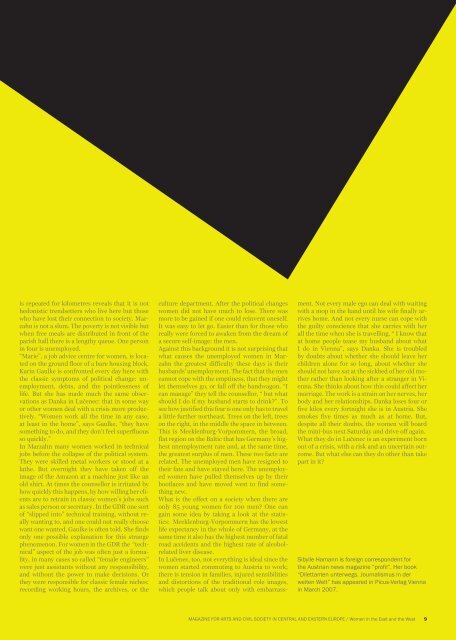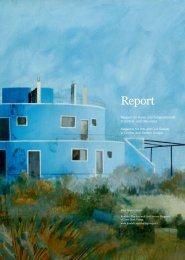You also want an ePaper? Increase the reach of your titles
YUMPU automatically turns print PDFs into web optimized ePapers that Google loves.
is repeated for kilometres reveals that it is not<br />
hedonistic trendsetters who live here but those<br />
who have lost their connection to society. Marzahn<br />
is not a slum. The poverty is not visible but<br />
when free meals are distributed in front of the<br />
parish hall there is a lengthy queue. One person<br />
in four is unemployed.<br />
“Marie”, a job advice centre for women, is located<br />
on the ground floor of a bare housing block.<br />
Karin Gaulke is confronted every day here with<br />
the classic symptoms of political change: unemployment,<br />
debts, and the pointlessness of<br />
life. But she has made much the same observations<br />
as Danka in Lučenec: that in some way<br />
or other women deal with a crisis more productively.<br />
“Women work all the time in any case,<br />
at least in the home”, says Gaulke, “they have<br />
something to do, and they don’t feel superfluous<br />
so quickly.”<br />
In Marzahn many women worked in technical<br />
jobs before the collapse of the political system.<br />
They were skilled metal workers or stood at a<br />
lathe. But overnight they have taken off the<br />
image of the Amazon at a machine just like an<br />
old shirt. At times the counsellor is irritated by<br />
how quickly this happens, by how willing her clients<br />
are to retrain in classic women’s jobs such<br />
as sales person or secretary. In the GDR one sort<br />
of “slipped into” technical training, without really<br />
wanting to, and one could not really choose<br />
want one wanted, Gaulke is often told. She finds<br />
only one possible explanation for this strange<br />
phenomenon. For women in the GDR the “technical”<br />
aspect of the job was often just a formality,<br />
in many cases so called “female engineers”<br />
were just assistants without any responsibility,<br />
and without the power to make decisions. Or<br />
they were responsible for classic female niches:<br />
recording working hours, the archives, or the<br />
culture department. After the political changes<br />
women did not have much to lose. There was<br />
more to be gained if one could reinvent oneself.<br />
It was easy to let go. Easier than for those who<br />
really were forced to awaken from the dream of<br />
a secure self-image: the men.<br />
Against this background it is not surprising that<br />
what causes the unemployed women in Marzahn<br />
the greatest difficulty these days is their<br />
husbands’ unemployment. The fact that the men<br />
cannot cope with the emptiness, that they might<br />
let themselves go, or fall off the bandwagon. “I<br />
can manage” they tell the counsellor, “ but what<br />
should I do if my husband starts to drink?”. To<br />
see how justified this fear is one only has to travel<br />
a little further northeast. Trees on the left, trees<br />
on the right, in the middle the space in between.<br />
This is Mecklenburg-Vorpommern, the broad,<br />
flat region on the Baltic that has Germany’s highest<br />
unemployment rate and, at the same time,<br />
the greatest surplus of men. These two facts are<br />
related. The unemployed men have resigned to<br />
their fate and have stayed here. The unemployed<br />
women have pulled themselves up by their<br />
bootlaces and have moved west to find something<br />
new.<br />
What is the effect on a society when there are<br />
only 85 young women for 100 men? One can<br />
gain some idea by taking a look at the statistics:<br />
Mecklenburg-Vorpommern has the lowest<br />
life expectancy in the whole of Germany, at the<br />
same time it also has the highest number of fatal<br />
road accidents and the highest rate of alcoholrelated<br />
liver disease.<br />
In Lučenec, too, not everything is ideal since the<br />
women started commuting to Austria to work;<br />
there is tension in families, injured sensibilities<br />
and distortions of the traditional role images,<br />
which people talk about only with embarrass-<br />
ment. Not every male ego can deal with waiting<br />
with a mop in the hand until his wife finally arrives<br />
home. And not every nurse can cope with<br />
the guilty conscience that she carries with her<br />
all the time when she is travelling. “ I know that<br />
at home people tease my husband about what<br />
I do in Vienna”, says Danka. She is troubled<br />
by doubts about whether she should leave her<br />
children alone for so long, about whether she<br />
should not have sat at the sickbed of her old mother<br />
rather than looking after a stranger in Vienna.<br />
She thinks about how this could affect her<br />
marriage. The work is a strain on her nerves, her<br />
body and her relationships. Danka loses four or<br />
five kilos every fortnight she is in Austria. She<br />
smokes five times as much as at home. But,<br />
despite all their doubts, the women will board<br />
the mini-bus next Saturday and drive off again.<br />
What they do in Lučenec is an experiment born<br />
out of a crisis, with a risk and an uncertain outcome.<br />
But what else can they do other than take<br />
part in it?<br />
Sibylle Hamann is foreign correspondent for<br />
the Austrian news magazine “profil”. Her book<br />
“Dilettanten unterwegs. Journalismus in der<br />
weiten Welt” has appeared in Picus-Verlag Vienna<br />
in March 2007.<br />
MAGAZINE FOR ARTS AND CIVIL SOCIETY IN CENTRAL AND EASTERN EUROPE / Women in the East and the West 9




